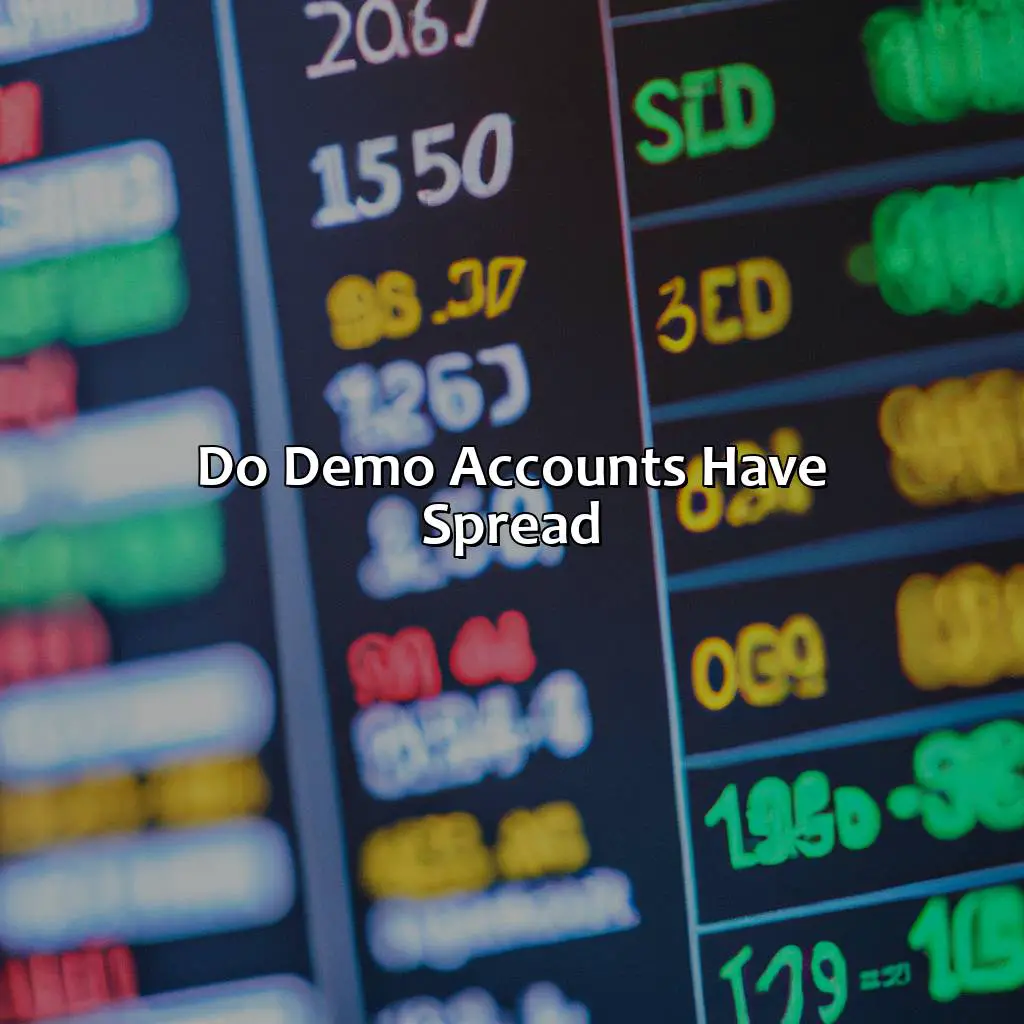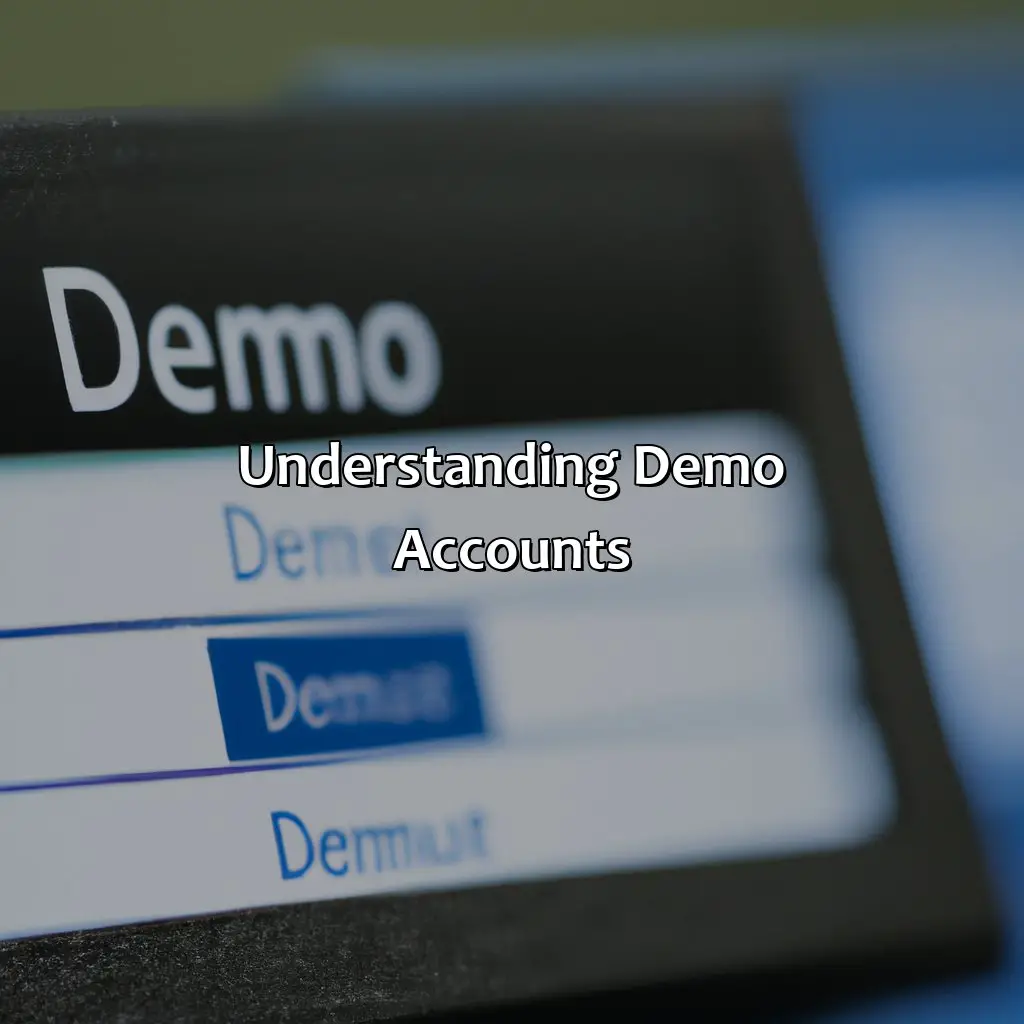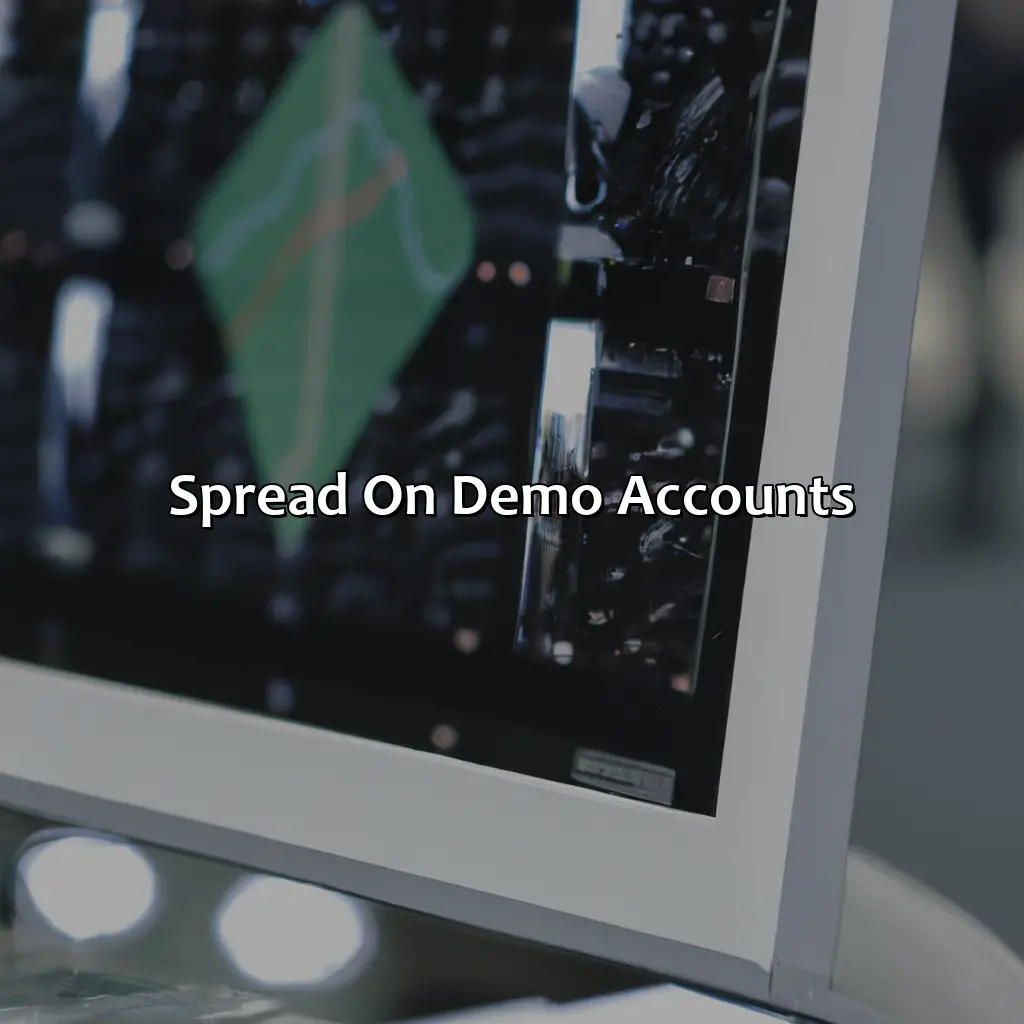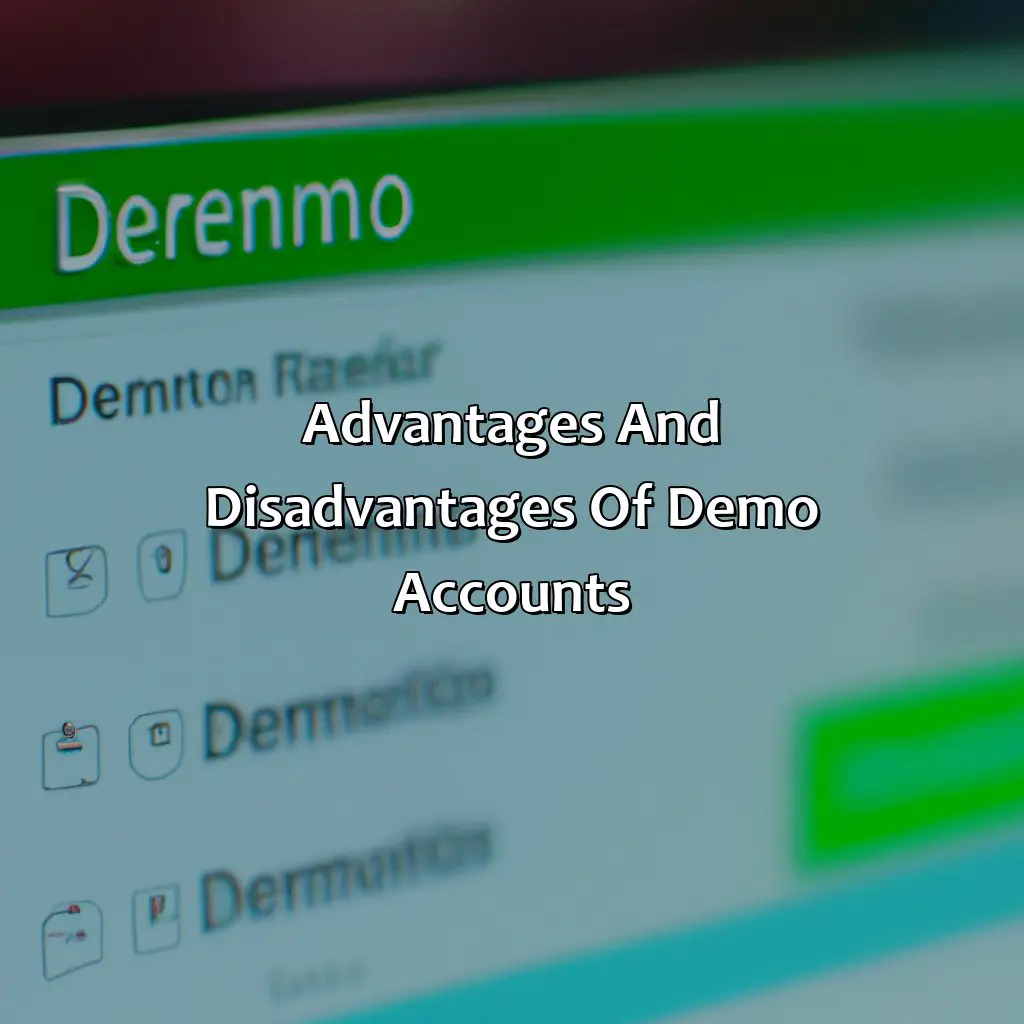
Key Takeaway:
- Demo accounts on forex trading platforms do have spreads, but they may differ from live trading accounts. Demo account spreads can either be fixed or variable, depending on the broker.
- Understanding what a demo account is will help you determine its purpose. Demo accounts are virtual trading platforms that allow you to practice trading using virtual money and test out trading strategies without risking any real money.
- While using a demo account, you should consider testing your trading strategies, backtesting your trades, and becoming familiar with the trading platform. Demo accounts may provide you with a sufficient amount of trading experience and risk management skills before trying out trading with real money on a live account.
Understanding Demo Accounts

Photo Credits: forexbrokerreport.com by Brian Taylor
Demo accounts are virtual trading accounts that allow budding traders to get the hang of forex trading before they engage in it in real life. These accounts simulate real-life conditions and offer traders a sense of what trading would be like without actually risking their money. As a result, traders can understand market dynamics, test different strategies, and sharpen their trading skills.
When it comes to spread, some demo accounts have them, while others don’t. Spread refers to the difference between the bid and ask prices of any given currency pair, which is akin to a commission charged by the broker. Some demo accounts have spread as they attempt to simulate real-life trading conditions, while others don’t have them as they are geared towards providing traders with an uninterrupted platform to practice and learn.
In addition to spread, demo accounts offer unique features like the ability to trade across multiple devices, access to market analysis and educational resources. Virtual trading on demo accounts also comes with no financial risk, so traders have the freedom to experiment and learn at their own pace.
For instance, John, a budding trader, decided to open a demo account with a forex broker to practice his trading skills. The broker offered him access to market analysis, educational resources, and uninterrupted trading without spread. John was able to practice his trading skills, understand market dynamics and test strategies without worrying about losing money. After a few months of virtual trading, John felt confident enough to open a real trading account and start trading forex for real.
What is a Demo Account?

Photo Credits: forexbrokerreport.com by Eugene Thompson
To grasp demo accounts for trading, explore their features and how they work. These accounts enable you to practice trading currency pairs without investing any real money. Their Characteristics and How They Work sections provide insight into backtesting, paper trading, live trading and trading psychology. This knowledge gives you a strong base for successful trading.
Characteristics of a Demo Account
A demo account offers a simulated environment to traders to practice skills and strategies without risking real money. The key characteristics of demo accounts are as follows:
- It provides risk-free trading.
- It allows traders to experiment with different markets and assets.
- It reduces psychological barriers and enhances confidence in trading.
- It simulates real-market scenarios, including volatile market conditions.
- The process of opening a demo account is simple and quick.
- It enables traders to test their backtesting and paper trading strategies before deploying them in a live account.
Moreover, the features offered by each broker on its demo platform may vary significantly. Some brokers provide access to all the tools, indicators, and historical data available on their live platform, while others may limit such features.
Traders should consider the limitations of demo accounts before relying on them entirely. While they provide an opportunity to sharpen one’s skills, fear of missing out may arise if only used for extended periods. As a result, novice traders should aim to transition from paper trading in a demo account to live trading with small amounts first so that they can gain hands-on experience.
Practice makes perfect, but only if you’re practicing with a demo account and not your life savings.
How Demo Accounts Work
Demo accounts are virtual platforms offered to traders for practice before live trading. The account mimics the real market with the difference being the absence of any financial risks. Traders can learn different strategies, improve their skills, and gain experience in a virtual environment.
To access demo accounts, a trader must register with their chosen brokerage firm. Upon successful registration, the broker assigns a dummy balance to the account, which can be used for trading activities. The virtual platform operates in a fully functional setting with all key features provided by live trading systems.
It is important to note that while demo accounts offer a realistic trading experience, they may differ from live trading systems in terms of execution speed and pricing accuracy due to various factors such as lack of liquidity.
Traders are warned against using Demo Accounts for too long as it can affect their trading psychology since there is no emotional involvement when dealing with unreal money. Practice on demo accounts should be limited while noting that they serve only as preparatory tools for live trading.
In one instance, Edith, an enthusiastic trader, practiced repeatedly on a demo account before finally switching to live trading. She was caught off-guard when she lost her investment because she failed to factor in emotions and psychological preparation necessary in real-life situations where traders risk capital investments.
Demo accounts may have no spread, but they do spread knowledge for a better trading experience.
Spread on Demo Accounts

Photo Credits: forexbrokerreport.com by Tyler Lewis
Do you want to learn about spread on demo accounts? They come with no real money risks! To get started, understand spread definition and the causes of different spreads, such as bid-ask, variable, and fixed. Also, discover how demo accounts with spread work, and how commission-free accounts are different. Lastly, compare spread on demo and live accounts, including trading fees.
Spread Definition and Causes
The spread refers to the difference between the bid and ask prices of a financial instrument. It is also known as the bid-ask spread and can be affected by various factors, such as market volatility, liquidity, and trading volume. The spread is an essential component in trading because it directly impacts the net profit or loss.
On demo accounts, the spread may either be fixed or variable depending on the broker’s policies. Fixed spreads remain constant, while variable spreads fluctuate depending on market conditions. Both types have their advantages and disadvantages.
Generally, demo accounts tend to have lower spreads compared to live accounts due to reduced liquidity and order execution speed. As a result, traders may experience lower costs associated with trading on demo accounts.
Certain brokers may also manipulate spreads on demo accounts to favor traders artificially or make them appear more competitive than they are in reality.
Overall, Demo Accounts provide beginner traders with a comprehensive grasp of online trading without risk of losing money.
Demo accounts: where the spread is as commission-free as a vegan buffet.
Spread on Demo Accounts
Demo Accounts and the Spread- A Comprehensive Guide
When it comes to trading in forex or other financial markets, understanding the concept of ‘spread’ is crucial. In a demo account, spread refers to the difference between the bid and ask price of a currency pair, which can impact your overall profits or losses.
The spread on demo accounts is simulated, meaning it is not influenced by external factors such as liquidity or market conditions. Therefore, the spread on demo accounts may be different than that of live accounts offered by brokers. Brokers often provide commission-free accounts with wider spreads on demo accounts to attract new traders and allow them to test their trading strategies without risking real money.
It is important to note that while the spread on demo accounts may not reflect exact market conditions, they are still an effective tool for practicing trading skills without incurring losses. However, traders should keep in mind that there may be brokerage fees or other charges associated with live trading that are not reflected in demo account spreads.
Pro Tip: When using a demo account for practice purposes, always pay attention to the spread trends over time and understand how they may change for live trades. Demo accounts may have no spread, but don’t get too excited – live accounts come with trading fees.
Comparison of Spread on Demo and Live Accounts
When it comes to trading, one of the biggest concerns is managing spread and trading fees. Demo Accounts provide an excellent opportunity to understand and experiment with such elements of trading. Now, let’s explore how demo accounts compare with live trading when it comes to Spread.
In the table below, we have showcased a comparison between demo accounts and live accounts in terms of spread rates for four different instruments – EUR/USD, GBP/USD, USD/CAD, and AUD/JPY.
| Trading Currency | Demo Account Average Spread (Pips) | Live Account Average Spread (Pips) |
|---|---|---|
| EUR/USD | 1.4 | 2.2 |
| GBP/USD | 1.7 | 2.3 |
| USD/CAD | 1.6 | 2.0 |
| AUD/JPY | 1.8 | 2.6 |
As per the data presented above, it can be observed that there is a reasonably high variation among the average spreads for demo accounts versus live accounts for each instrument analysed.
It’s worth noting that while demo account allows beginners to learn the basics of trading without risking their own money, some brokers tend to manipulate demo account spreads to entice traders into opening real accounts eventually.
Therefore, when it comes to actual executions using a live account where real money is at stake, spreads could be much wider due to various market conditions compared to those depicted in your broker’s demo account.
Before investing any funds in live trading or even using a given broker’s services for longer-term trading activities; It would help if you researched this element properly before committing your time or resources blindly.
Overall, it would be best always to use these demo account platforms relatively two-fold: as an introduction educational tool for experimentation & practical learning but also bearing in mind that there may exist inherent differences once you start real-life trades. Demo accounts: where you can learn from your mistakes without losing your shirt, but also never feel the rush of a real profit.
Advantages and Disadvantages of Demo Accounts

Photo Credits: forexbrokerreport.com by Zachary Sanchez
Comprehending the importance of demo accounts in trading necessitates comprehending the advantages and the disadvantages. To unlock this, “Advantages and Disadvantages of Demo Accounts” with sub-sections such as “Advantages of Using a Demo Account” and “Disadvantages of Using a Demo Account” can help you understand the pros and cons. This way, you can learn how demo accounts function as a trading experience. You can also use them to control your risks and educate yourself about trading strategies, technical analysis, fundamental analysis, and trading systems. On the contrary, you can also identify the downsides such as trading algorithms, trading software, social trading, copy trading, and trading signals.
Advantages of Using a Demo Account
Demo accounts are a powerful tool for traders to test their trading strategies, technical analysis and fundamental analysis without risking any real money. By understanding the benefits of using a demo account, traders can enhance their decision-making skills while also gaining confidence in trading systems.
- Eliminates risk and anxiety – Demo accounts allow beginners to familiarize themselves with the trading system without fearing potential losses. It reduces the stress related to live trading which may hinder effective decision-making.
- Offers real-life simulation – Demo accounts provide a realistic simulation of a live trading environment, enabling traders to experience what it feels like to trade in actual markets.
- Allows testing of multiple strategies – Traders can test various trading strategies using demo accounts. They can analyze the results and achieve success before entering the market.
Moreover, demo accounts are an excellent way for traders to understand spread differences between different brokers. This knowledge provides an additional advantage when choosing the most suitable broker for their specific requirements.
Once I read about a trader who had been searching for a suitable strategy for months but could not choose one that he was satisfied with until he tried on his demo account after which he realized that he required lesser indicators than previously assumed. This experience helped him simplify his analysis process and focus more on price actions that ultimately led to greater profits.
Demo accounts may not fully prepare you for the unpredictable nature of real trading with trading algorithms, trading software, social trading, copy trading, and trading signals.
Disadvantages of Using a Demo Account
Demo accounts are useful for new traders to practice with a trading platform before dealing with real money. They have their own set of disadvantages that need to be considered.
- Demo trading does not account for emotional or psychological factors which may affect real trading conditions.
- The availability of certain trading algorithms, social trading, copy trading, and trading signals may vary between demo accounts and live accounts.
- Demo accounts do not simulate all market conditions as they don’t include slippage and latency issues in execution.
Pro Tip: While using a demo account, consider the disadvantage that they do not fully represent live market conditions. Demo accounts may not provide real profits, but they offer priceless experiences for traders seeking to improve their performance and interact with the trading community and mentors.
Final Thoughts

Photo Credits: forexbrokerreport.com by Roy Campbell
Let’s wrap up our exploration of demo accounts and how to maximize trading performance. We’ll emphasize the importance of using demo accounts to gain market analysis experience without risking funds. We’ll cover the various aspects of demo trading such as:
- trading rules
- regulations
- commissions
- spreads
- safety
- security
- myths and misconceptions
Let’s get started!
Summary
Demonstration accounts, offered by forex brokers, are simulated trading environments used to practice executing trades without risking actual money. These accounts have no spread and offer all of the functionalities that a live account would provide, allowing beginners to gain experience in the market under safe conditions.
Using a demo account has various advantages, including the ability to experiment with new trading strategies and identify weaknesses in existing ones. However, these accounts also have their drawbacks, such as providing unrealistic expectations of the market due to flaws in market analysis.
It’s crucial for traders to understand that while demonstration accounts offer a safe environment for practice, real-life trading conditions will differ vastly from those of a simulation. As such, users must remain mindful when developing their skills on these platforms.
Pro Tip: Use demo accounts wisely. They are great for practicing new strategies or testing how well your old ones hold up under different conditions.
Conclusion
Demo accounts are an excellent way for traders to practice their trading strategies and evaluate new trading platforms. However, it is important to note that demo accounts also come with their own advantages and disadvantages.
Some of the benefits of demo trading include:
- Developing one’s trading discipline.
- Getting comfortable with trading rules and regulations.
On the other hand, demo accounts cannot accurately replicate the trading commissions, spreads, or slippage that one would experience in a live account.
It is essential for traders to use demo accounts as a supplement to their overall trading goals, rather than relying on them completely. Additionally, it is crucial to recognize the myths and misconceptions surrounding demo trading safety and security regarding its authenticity and credibility.
Five Facts about “Do Demo Accounts Have Spread?”
- ✅ Demo accounts allow traders to practice trading without risking real money. (Source: Investopedia)
- ✅ Demo accounts typically have virtual funds that traders can use to place trades. (Source: FXCM)
- ✅ Demo accounts do not usually replicate the exact spreads of real accounts. (Source: Admiral Markets)
- ✅ Demo account spreads can vary depending on the broker. (Source: DailyFX)
- ✅ It is important for traders to use demo accounts to test trading strategies and learn about the trading platform before opening a real account. (Source: IG)
FAQs about Do Demo Accounts Have Spread?
Do demo accounts have spread?
Yes, demo accounts have spread, but the spread rates may differ from actual accounts because brokers adjust prices according to market circumstances.
How does the Forex demo account help in the trading career?
Forex demo account helps traders familiarize themselves with trading patterns such as Head and Shoulders, Double Top, Bottom, Cup and Handle, Triangle, Flag, Pennant, Wedge, Candlestick Patterns, Fibonacci Retracement, Elliott Wave Theory, Harmonic Patterns, and more. It allows traders to learn how to navigate through different markets and strategies without risking their money.
How do requote rates affect trading on a demo account?
Requote rates do not affect trading on demo accounts since they do not involve actual investments. However, it is essential to understand requote rates in actual accounts to manage risks better.
What is the significance of the speed of execution in Forex demo accounts?
The speed of execution is vital in Forex demo accounts as it reflects a broker’s pricing feed, which affects the differential spreads. Slower executions may result in different prices, accurate predictions, and missed opportunities.
What is Volume Differential, and how does it work in Forex demo accounts?
Volume differential refers to the variance in the units of currencies between the counterparts in a Forex transaction. In demo accounts, volume differential helps traders manage risks and develop better trading strategies by understanding its impact on investment management.
What is a Super App platform?
A Super App platform provides customers with a one-stop-shop solution for financial services, banking, payments, investment management, and social networking. It serves as a unified platform for managing multiple aspects of a person’s financial life, helping them make a living.

